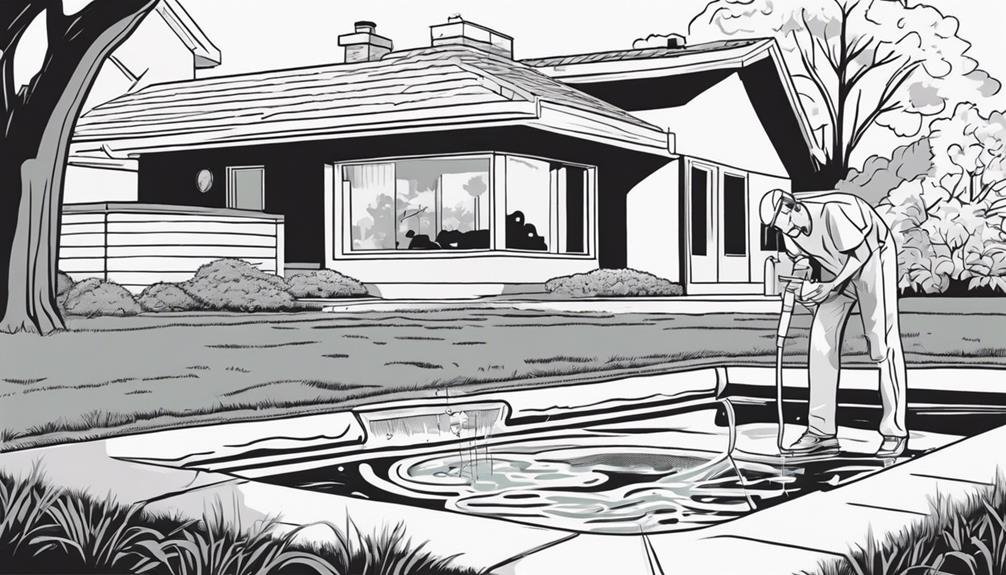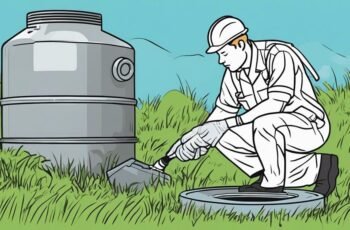Ensuring your septic system stays in top shape requires a keen eye and diligent care. From regular inspections to mindful waste disposal practices, there are crucial steps every homeowner should take to preserve the health of their septic tank.
But what happens when you encounter an unexpected issue or suspect a problem lurking beneath the surface? Stay tuned to discover the essential checklist that will help you navigate the ins and outs of septic tank maintenance, ensuring your system functions smoothly for years to come.
Key Takeaways
- Regular professional inspections every 3-5 years are crucial for assessing septic tank condition.
- Avoid improper waste disposal like oils and chemicals to maintain septic system health.
- Watch for signs of system issues like odors, water pooling, and slow drains for early detection.
- Follow recommended pumping frequencies based on household size to prevent system failures.
Septic Tank Inspection Schedule

To ensure proper maintenance, it's crucial to follow a regular septic tank inspection schedule. Septic tank odors are a common sign that your system may need attention. If you notice unpleasant smells around your property, it could indicate issues within the tank or drainage field that need addressing promptly.
Groundwater contamination is a serious concern associated with septic system malfunctions. Regular inspections help prevent leaks or overflows that could lead to harmful bacteria seeping into the groundwater supply.
Scheduling a professional inspection every 3-5 years is generally recommended. However, if you have a larger household or suspect a problem, more frequent checks may be necessary. During these inspections, experts will assess the overall condition of the tank, check for any signs of leakage, and ensure that the drainage field is functioning correctly.
Proper Waste Disposal Techniques
Considering the importance of maintaining a healthy septic system, understanding proper waste disposal techniques is key to ensuring its longevity and effectiveness.
When it comes to grease disposal, it's crucial to avoid pouring cooking oils or fats down the drain. Instead, collect grease in a container and dispose of it in the trash to prevent clogging in your septic system.
Chemical cleaners should also be used sparingly or avoided altogether as they can disrupt the natural balance of bacteria in the tank, leading to potential issues. Opt for septic-safe alternatives or natural cleaning methods to protect your system.
Signs of Septic System Issues

Early detection of septic system issues is crucial for preventing major malfunctions and costly repairs. Here are four signs that indicate potential problems with your septic system:
- Foul Odors: If you notice persistent foul odors in your yard or near the drain field, it could indicate a problem with your septic system. The smell may be due to a full or failing system, leaking pipes, or a clogged drain field.
- Pooling Water: Puddles of water forming around the septic tank or drain field can signal a problem. This pooling water may indicate a blockage in the system, causing wastewater to surface instead of being properly absorbed.
- Slow Drains: Slow draining sinks, showers, or toilets throughout your home could be a sign of an issue. It might indicate a full septic tank, clogged pipes, or a failing drain field.
- Lush Grass: While it may seem counterintuitive, an unusually lush and green patch of grass above your septic tank or drain field could indicate a leak. The excess nutrients from a leaking system can act as fertilizer, promoting the growth of grass in that area.
Septic Tank Pumping Frequency
Determining the appropriate septic tank pumping frequency is essential for maintaining a healthy and efficient septic system. Regular frequency monitoring ensures that your septic tank operates effectively. The pumping frequency depends on factors such as household size, water usage, and tank capacity.
As a general guideline, septic tanks should be pumped every 3 to 5 years for an average household. However, if your household has more occupants or if you use a garbage disposal frequently, you may need more frequent pumping. Monitoring the sludge and scum levels in your tank can also help determine when pumping is necessary.
It's crucial to consider your tank's capacity when establishing a pumping schedule. Overlooking regular pumping can lead to issues like clogs, backups, and system failure. By staying attentive to your tank's needs and understanding the factors that influence pumping frequency, you can ensure the longevity and efficiency of your septic system.
Frequently Asked Questions
Are There Any Specific Cleaning Products Homeowners Should Avoid Using to Prevent Damage to Their Septic Tank?
When cleaning your septic tank, avoid using harsh chemicals like bleach or drain cleaners. These substances can disrupt the natural balance of bacteria in the tank, leading to issues. Opt for safe alternatives to protect your system.
How Can Homeowners Prevent Tree Roots From Invading and Clogging Their Septic System?
To keep tree roots from infiltrating and clogging your septic system, install root barriers around the tank area. Consider preventive treatments to deter root growth. Schedule regular professional inspections and maintenance services to ensure your system remains root-free.
What Steps Can Homeowners Take to Minimize Water Usage and Reduce Strain on Their Septic Tank?
To minimize strain on your septic tank, adopt water conservation practices like fixing leaks, installing efficient plumbing fixtures, and using sustainable landscaping techniques. These steps help reduce water usage and prevent overloading your system.
Are There Any DIY Maintenance Tasks That Homeowners Can Perform to Extend the Lifespan of Their Septic System?
To extend the lifespan of your septic system, you can perform DIY tasks like regular drain field maintenance and using septic tank additives. These simple steps help prevent issues, ensuring your system operates efficiently.
How Can Homeowners Ensure That Their Septic System Is Properly Sized for the Number of People Living in Their Household?
To properly size your septic tank for household needs, consider factors like daily water usage and the number of occupants. Hire a professional to assess your installation requirements accurately, ensuring efficient household wastewater management.
Conclusion
Now that you have learned about essential homeowner septic tank maintenance, remember that regular inspections and proper waste disposal are crucial.
Keep an eye out for any signs of issues with your septic system and schedule routine pumpings to prevent costly repairs down the line.
Your septic tank is like the heart of your home, so don't neglect its care and maintenance to ensure smooth flowing operations.

